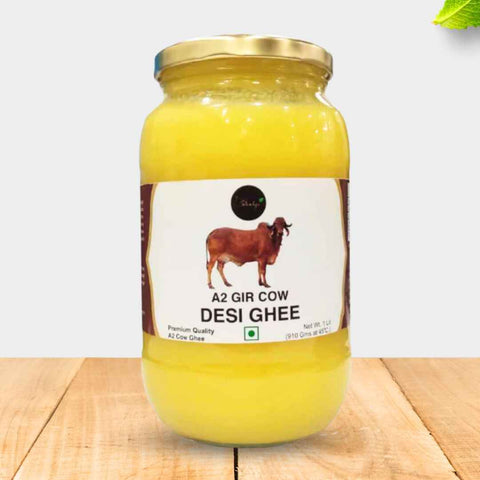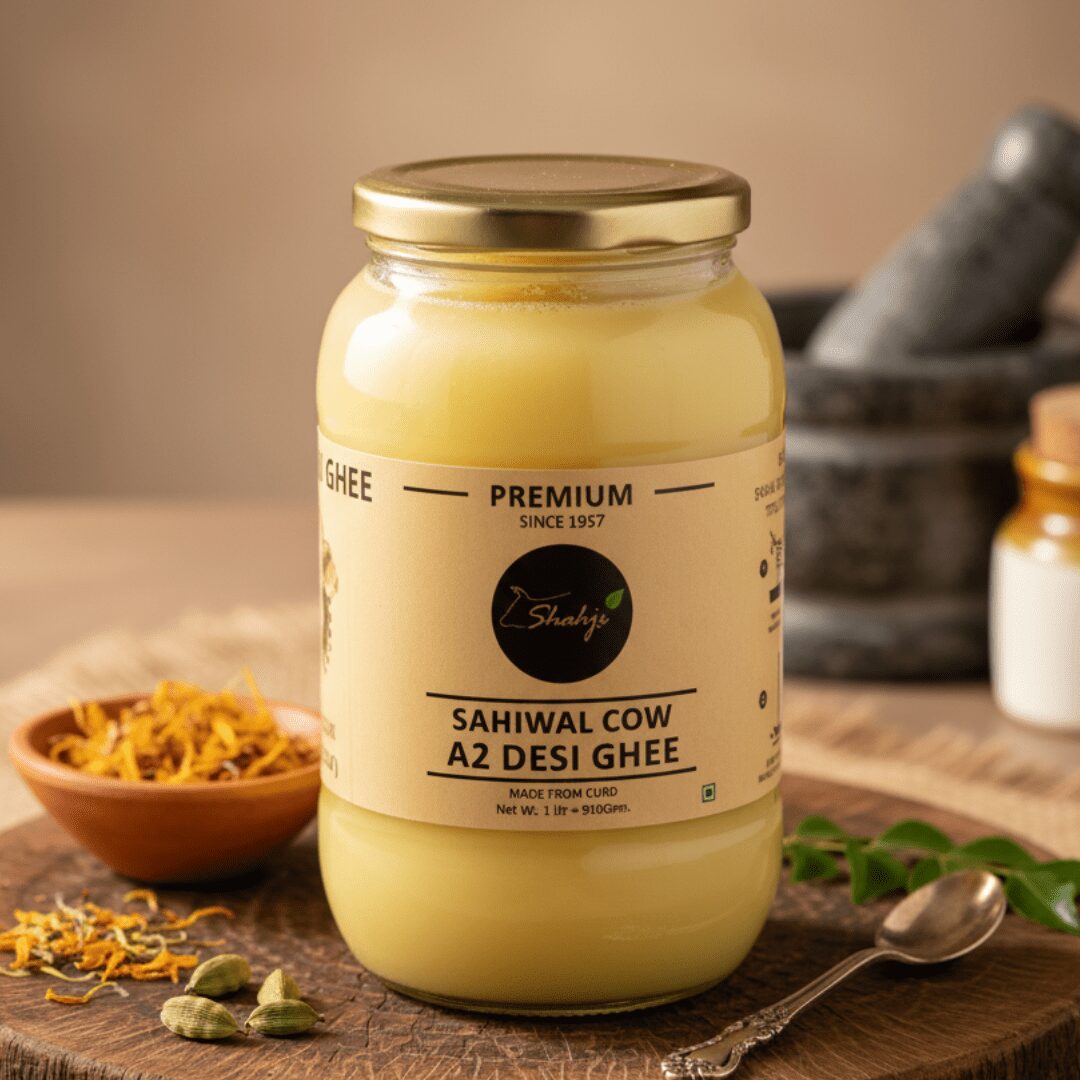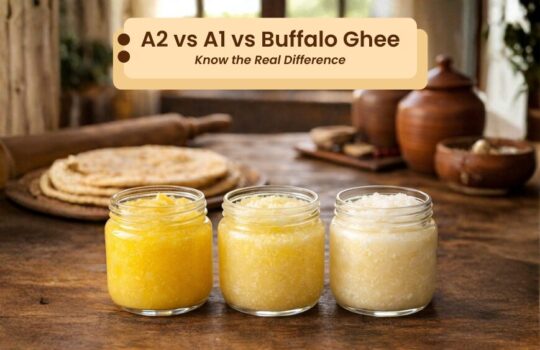Why is ghee good for lactose-intolerant?

Ghee has many benefits, it is popular not only because of its health benefits and cooking usefulness but also because it is suitable for lactose-intolerant people. But the question is why is ghee good for lactose-intolerant people? And why some people are not tolerant of lactose? In this article, we will look into this question and will find the answer to this. So, keep reading.
What is ghee?
Ghee is a form of clarified butter commonly used in Indian cuisine and Ayurvedic medicine. It is made by simmering butter to remove the milk solids and water, resulting in a pure butterfat called ghee. While ghee is derived from milk, it is different from regular butter in terms of its composition and lactose content.
What is lactose-intolerant?
Lactose intolerance is a digestive disorder characterized by the body\’s inability to fully digest lactose, a sugar found in milk and dairy products. It occurs due to a deficiency or absence of the enzyme lactase, which is produced in the small intestine and necessary for breaking down lactose into simpler sugars (glucose and galactose) that can be absorbed by the body.

When lactose is not properly digested, it passes into the large intestine where it interacts with bacteria, leading to the production of gas and various symptoms such as bloating, abdominal pain, diarrhoea, and gas.
Lactose intolerance can vary in severity from person to person. Some individuals may be able to tolerate small amounts of lactose without experiencing symptoms, while others may have more pronounced reactions even to trace amounts of lactose.
Why are some peoples are lactose intolerant?
Before we talk about why is ghee good for lactose-intolerant people? Let\’s understand first why some people are lactose intolerant. Some people are not tolerant of lactose because they are unable to digest the lactose.
Lactose, a sugar found in milk and dairy products, is dependent on the production of an enzyme called lactase. Lactase is responsible for breaking down lactose into simpler sugars (glucose and galactose) that can be easily absorbed by the body. However, in some people, lactase production decreases or ceases after infancy, leading to lactose intolerance.
We are mentioning some reasons why some people are not tolerant of lactose:
- Genetic Factors: The most common cause of lactose intolerance is a genetically determined decrease in lactase production that occurs after weaning off breast milk. This primary lactose intolerance is more prevalent in certain populations, particularly individuals of East Asian, African, Native American, and Hispanic descent.
- Age-related Decline: Lactase production tends to naturally decline as people age. Many individuals who were once able to tolerate lactose may develop lactose intolerance later in life. This type of lactose intolerance is often referred to as adult-onset lactose intolerance.
- Secondary Causes: Lactose intolerance can also occur as a secondary condition due to an underlying health issue or injury that damages the lining of the small intestine. Conditions such as celiac disease, inflammatory bowel disease (IBD), bacterial overgrowth, or gastrointestinal infections can lead to temporary lactose intolerance until the underlying issue is resolved.
- Congenital Lactase Deficiency(CLD): In rare cases, individuals are born with a complete absence or severe deficiency of lactase. This condition, known as congenital lactase deficiency, is a genetic disorder that requires specialized medical attention and dietary management from early infancy.
Note: It\’s important to note that lactose intolerance is different from a milk allergy. A milk allergy is an immune response to proteins in milk, whereas lactose intolerance is a digestive issue related to the inability to digest lactose.
Also read:
- What is A2 cow ghee and its benefits?
- A1 Ghee Vs A2 Ghee: Which is Best for Health?
- Anveshan Vs Two Brothers Vs Shahji A2 Ghee
If you suspect you have lactose intolerance, it is recommended to consult with a healthcare professional who can provide a proper diagnosis and guide you on managing your diet to minimize symptoms while ensuring adequate nutrition.
Why are ghee good for lactose-intolerant peoples?
Now let’s discuss why is ghee good for lactose-intolerant people. See, Ghee is primarily composed of butterfat and contains traces amount of lactose and casein. During the clarification process, the milk solids, including the lactose and casein are separated from the butterfat.

As a result, ghee is considered to be virtually lactose-free or contains only trace amounts of lactose. As we know the lactose-intolerant person doesn’t secrete sufficient lactase to break down the lactose. So, a ghee-like superfood is the best option for them because it doesn’t contain lactose and hence. This makes it a suitable alternative for individuals with lactose intolerance.
Conclusion
In conclusion, lactose intolerance is a digestive disorder that is characterized by the inability to digest lactose due to a deficiency of the enzyme lactase. The person who is lactose intolerant is not able to digest lactose which leads to various symptoms such as bloating, abdominal pain, diarrhoea, and gas.
Several reasons that make people intolerant towards lactose are genetic factors, age-related decline, secondary causes, congenital lactose deficiency, etc.
For lactose intolerant people ghee is like a boon because ghee doesn’t contain or contain in trace amounts of milk solids (lactose and casein). This makes a good option (other than butter) for people who want to eat dairy products but are lactose intolerant. They can incorporate ghee into their diet and enjoy the delightful taste of ghee without any allergy.
A2 Gir Cow Ghee
1 LTR
Best Price: ₹2125 with Coupons

A2 Gir Cow Ghee 2 Litre Combo Pack
Best Price: ₹4125 with Coupons
A2 Sahiwal Cow Ghee
1 LTR
Best Price: ₹1619 with Coupons

Frequently Asked Questions – FAQs
What is ghee?
Ghee is a form of clarified butter obtained from the slow simmering of butter on a low flame and straining out the milk solids from the butter leaving behind the pure golden liquid called ghee.
What is lactose intolerance?
Lactose intolerance is a digestive disorder in which individuals are unable to digest dairy items that contain lactose.
Why some people are lactose intolerant?
Some people are suffering from lactose intolerance because they have a deficiency or absence of the enzyme lactase, produced in the small intestine that is necessary for breaking down lactose into simpler sugars (glucose and galactose) that can be absorbed by the body.
Why ghee is good for lactose-intolerant people?
Ghee is good for lactose intolerant because ghee doesn’t contain any milk solids such as lactose and casein.
Is milk allergy is same as lactose-intolerant?
No, milk allergy is not the same as lactose-intolerant because milk allergy is an immune response to proteins in milk, whereas lactose intolerance is a digestive issue related to the inability to digest lactose.













